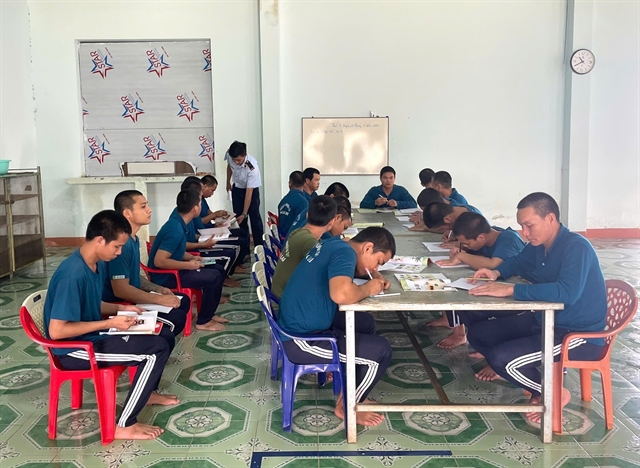 Society
Society


|
| Lieutenant Colonel Trần Đình Hùng instructs "special" students to read and write. —VNA/VNS Photo |
GIA LAI — For the past four months, a special class teaching literacy to those undergoing drug rehabilitation treatment is being held regularly at the Gia Lai Province Drug Rehabilitation Centre.
The class is not only a place to practise writing and math, but also a support in the journey to help those who have made mistakes find themselves again and prepare to reintegrate into the community.
Since operations began in March this year, staff and soldiers working at the centre could not help but worry when they saw many young people who were illiterate.
Among the 238 people being treated, 21 were completely illiterate, most of whom were members of ethnic communities with difficult circumstances.
Deputy Head of the centre Lieutenant Colonel Trần Đình Hùng said that the illiteracy rate among the centre’s patients is quite high, posing many difficulties in their political, legal and life skills education.
The unit has determined that literacy education should be a compulsory component to help patients, and ultimately to develop proper awareness and change.
A literacy class was therefore established right at the centre, using a simple and practical curriculum.
In addition to learning reading and writing, trainees are also taught basic arithmetic.
Out of the 21 trainees currently taking the class, 17 are from ethnic groups, most of whom have never attended school.
Among these, trainee H.V.N., born in 1986 in Ia Hrú Commune, Gia Lai Province, is a notable example.
Having never attended school and after struggling with drug addiction for many years, he was admitted to the centre in March.

|
| Students taking the class. — VNA/VNS Photo |
N. said that due to family difficulties, he never had the opportunity to go to school and learn to read and write. At the rehabilitation centre, thanks to the dedicated guidance of the staff, he now knows how to do both, and understands the value of education.
"I had never known how to read or write. Here, I was given the opportunity to learn, and each day I can see positive changes in myself and discover many new things through studying. This is very helpful. In the future, when I reintegrate into society and start working, it will be much easier," N. said.
The main teacher for the class is Senior Lieutenant Võ Thị Diễm Phúc.
Without formal pedagogical training, she and her colleagues had to figure out on their own how to teach in a way that is easy for the students to understand and remember.
She even spent her evenings watching social media videos to learn adult literacy teaching methods.
"We try to convey knowledge in the simplest and most relatable way possible, so that trainees can easily grasp and make progress every day," said the Senior Lieutenant.
Aside from daytime classes, staff also offer one-on-one tutoring in the evenings and on weekends for slower learners.
Thanks to their efforts, 100 per cent of the trainees in the class can now read, write and do basic arithmetic.
According to the centre’s staff, literacy is just the first step in a longer journey of supporting patients.
The centre is planning to coordinate with educational institutions to help patients complete primary education, equipping them with essential knowledge to gradually change their perception and shape their future direction.
Lieutenant Colonel Hùng said: “Once trainees are literate, they gain clearer awareness and are able to understand things correctly and think rationally.”
“Only then can they begin to amend their mistakes and gradually reintegrate into society,” he said.
After more than two months of hard work, the first results of the class have been recorded. Trainee N. was able to write his very first letter to his parents. Though the handwriting was still shaky, it carried deep emotion and an awakening spirit: "Dear Mum and Dad. I have learned to read and write. I am sorry for all the hardship I have caused you. I will try my best to beat my addiction so I can become a useful person to society."
It's a letter that sparks a ray of hope. Behind the closed gates of the rehabilitation centre, the quiet literacy class opens up a new path, a path from awareness to rehabilitation. — VNS




